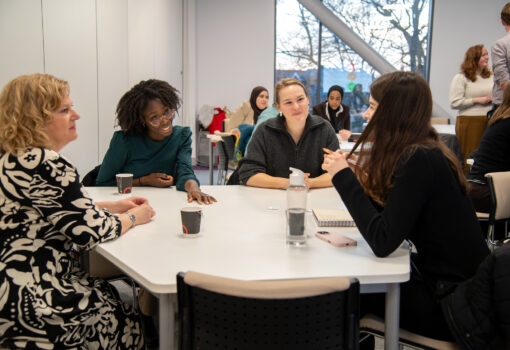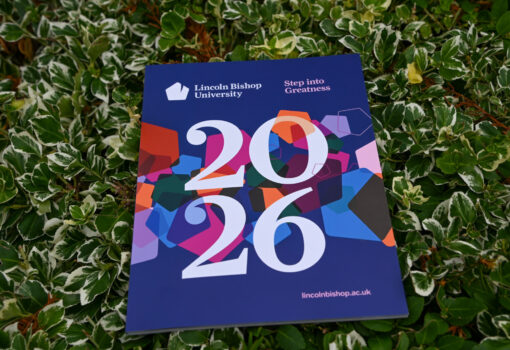Search results
-
Field Archaeology
The Archaeology Team at Lincoln Bishop are experienced in field archaeology. Our research various from the medieval period right up to the present day. We have a particular interest in landscape archaeology and archaeological surveying. -
Aviation Archaeology
The vast numbers of airfield’s operational throughout Lincolnshire in the Second World War earned the region the nickname ‘Bomber County’. The Archaeology Team at Lincoln Bishop undertakes diverse research into aviation archaeology and history. One aspect of this project has been to study the United States Army Air Forces (USAAF) presence in the East of England through the everyday objects they left behind. Our work brings together researchers, student archaeologists, local history societies and veterans to shed light onto the lives of the US service personnel in the UK during the war. If you are interested in finding out more about this project, please email derwin.gregory@bishopg.ac.uk. Image credit ©FRE 5731 -
RAF Thorpe Abbotts
In 1943, RAF Thorpe Abbotts became home to the United States Army Air Force’s (USAAF) 100th Bomb Group. This unit eventually gained the nickname ‘The Bloody Hundredth’ due to heavy losses they suffered in combat. Through undertaking archaeological excavations at RAF Thorpe Abbotts’ communal and accommodation sites, we have been uncovering the material culture of the USAAF from the Second World War. From these finds, we have been able to envisage, for example, what they ate and drank, what illnesses they were treated for and what products they used in their everyday lives. -
Lincoln Civic Trust Scholarship Award 2021 Opens for Applications
Applications are invited for the Lincoln Civic Trust scholarship award 2021-22, which is funded by the Lincoln Civic Trust and Lincoln Bishop University. The award honours the work of Richard Lucas, the Trust’s founding president and noted local historian. Applications are open to students who are enrolled on the MA in Social & Cultural History who are either studying full-time 2021-2022 or who are undertaking their second year of part-time study. The scholarship is competitive. Applicants must submit a 1000 word research proposal on their choice of dissertation subject which MUST address an aspect of the history of the City of Lincoln, and/or Lincolnshire. The outline should include: NameContact detailsIndication of stage of study (full-time or part-time)A clear statement on the intended area of research, the significance of the research and archives to be consulted The award will be administered as a discount of £2,000 against the tuition fee payable by the selected student for the MA in Social & Cultural History during the academic year 2021-22. The recipient of the award will be invited to attend the Lincoln Civic Trust’s Annual General Meeting and present their dissertation research outline. They will be expected to return after the completion and submission of their dissertation and give an illustrated presentation on their findings. They will also be invited to publish a short written summary of their dissertation research in a newsletter, magazine, and/or report. The closing date for this scholarship is Monday 27th September 2021, no later than 4pm. Any applications received after this time will not be accepted. The selection of the recipient will be based on expert review undertaken by academic staff within the History subject area. Their decision in the matter is final. Applicants are to submit their applications via email to the Programme Leader, Dr Claire Hubbard-Hall: claire.hubbard-hall@bishopg.ac.uk -
PGCE Trainees Use Lockdown Experiences to Craft Personal Poems
Inspired by poet Nina Alonso, PGCE trainees at Bishop Grosseteste University have created personal, Cento poems to share their experiences of life in lockdown -
Sulgrave Castle
The Archaeology Team at Lincoln Bishop is also focused on supporting local heritage and archaeology societies to carry out and publish their work. The publication of archaeological investigations is a key component of the archaeological process and something we readily support. One such project is helping the Sulgrave Castle Archaeological Group, an element of the Sulgrave History Society, publish the extensive excavations on their site, which started in 1960 and have continued until very recently. The site itself is an important example of the changes that occurred in the Anglo-Norman period, with evidence of substantial and important Saxon buildings that were replaced by a Norman motte and bailey castle. It is intended that the main findings of the excavations will be published in The Archaeological Journal, and an open access report of all the works will also be made available. -
Stefanie Jacklin
Stef joined Lincoln Bishop University in January 2021, on a part- time basis whilst still working as a primary school teacher. In April, she moved across to Lincoln Bishop full- time. Stef is an ex-student of Lincoln Bishop University and has many fond memories of the University. Stef started her teaching career in Peterborough and then moved to Lincolnshire. During Stef’s many years of teaching, she has led a range of subjects including Science, English, and Humanities. Humanities, diversity, and black history are areas which really interest Stef. In her previous teaching role, Stef was School Direct and NQT Lead mentor for a multi-academy Trust in Lincolnshire. As a Senior Lecturer, Stef primarily teaches and contributes to the PGCE 5-11 programme as well as contributing to the Undergraduate and School Direct programmes. -
Join BGU Academics for ‘Florence Nightingale – Beyond the Lady with the Lamp’
Join Dr Jonathan Memel and Dr Claudia Capancioni for ‘Florence Nightingale – Beyond the Lady with the Lamp’, an online event organised by BAVS@Home that offers a series of 'flash' talks by four leading Nightingale scholars, followed by a lively roundtable discussion and Q&A. The next BAVS@Home event will take place on 26 May at 6pm: ‘Florence Nightingale – Beyond the Lady with the Lamp’. Despite rich scholarship on the history and writings of Florence Nightingale, very little attention has been paid to the influence of the many different concepts and material realities of home on her life and work. Nightingale’s life was spent almost entirely in houses and in institutions that she consciously sought to render more home-like. It is clear from her writings and recorded experiences that homes are physically and figuratively central to her conception of good and ill health. This talk by Professor Paul Crawford, Dr Anna Greenwood, Dr Richard Bates and Dr Jonathan Memel at the University of Nottingham and Lincoln Bishop University will present research from Florence Nightingale Comes Home for 2020, a three-year, Arts and Humanities Research Council (AHRC)-funded project, and related book, Florence Nightingale at Home (Palgrave, 2020), that addresses this theme. Read more about the book here. The discussion will be chaired by Dr Claudia Capancioni (Lincoln Bishop University). This event is part of the BAVS@Home series hosted by the British Association for Victorian Studies. Tickets are free to all BAVS members and just £5 for non-members. Register for the event here: https://www.eventbrite.co.uk/e/bavshome-florence-nightingale-beyond-the-lady-with-the-lamp-tickets-153671837603 -
Aspirations, wellbeing and depression explored by Psychology students at national research conference
Three third year Psychology students from Lincoln Bishop University (Lincoln Bishop) presented their dissertations at the national Conference of the British Society for the Study of Individual Differences (BSPID) last week. Covering topics including postnatal depression, adult stress and life goals, Eniko Wagner, Tyler Cameron and Lauren Paul, showcased their work in front of a large audience of peers, researchers and academics. -
BGU Staff Members Contribute to Award Winning Book
Lincoln Bishop University’s Dr Andrew Jackson, Head of Research, and Dr Rose Roberto, Teaching Resources Librarian and History Lecturer, have contributed to The Edinburgh History of the British and Irish Press, a unique resource recently awarded The Robert and Vineta Colby Scholarly Book Prize by The Research Society for Victorian Periodicals (RSVP). The Edinburgh History of the British and Irish Press is a collection of essays examining nineteenth-century British and Irish newspaper and periodical history during a key period of change and development. It covers an important point of expansion in periodical and press history across the four nations of Great Britain (England, Ireland, Scotland and Wales), concentrating on cross-border and transnational comparisons and contrasts in nineteenth-century print communication. Designed to provide readers with a clear understanding of the current state of research in the field, in addition to an extensive introduction, it includes forty newly commissioned chapters and case studies exploring a full range of press activity and press genres. Practical features in this tome, which probably swayed the panel, include a helpful timeline of significant events in the history of printing technology intersecting with social, political, and cultural history. There are also a large selection of high-resolution images showing 19th-century visual and tactile material that readers will find engaging. The Colby Prize is for original book-length scholarship about Victorian periodicals and newspapers and in awarding it to The Edinburgh History of the British and Irish Press, the RSVP praised the new book for being “a remarkable, wide-ranging resource that gives welcome attention to diversity and transnational connections.” Continuing their praise the society added: “It will be valuable for a wide range of readers. RSVP is pleased to honour the work of all the writers as well as the editor, who together have made a contribution to nineteenth-century periodical studies that will remain a standard for many years to come.” Dr Roberto and Dr Jackson authored chapters 3 and 26 respectively. Speaking after the announcement Dr Jackson discussed what readers could expect from the book: "Our newspaper media today owes much to its history of rapid expansion and cultural diversification during the nineteenth century. This volume provides a definitive survey, and a wide-ranging and deep exploration. It was privilege to contribute, offering perspectives on the great outpouring of local and regional newspapers, and what these tell us about the development and character of the communities and districts in which we live today." Dr Roberto shared her excitement at her inclusion and on the potential impact the book could have: “I was delighted to find out that my paper at an international conference in Edinburgh, called “Communities of Communication” was the basis of an award-winning book. There were numerous outstanding presentations that were delivered over two days, and I am pleased and humbled that my research on Victorian-era illustration was chosen by editor David Finkelstein for inclusion in this comprehensive volume.” The Edinburgh History of the British and Irish Press is available as an e-book at the Lincoln Bishop Library. Members of the Lincoln Bishop community can access it by clicking here. To create your own successes in our collaborative learning community, visit our website, speak to a member of our Enquiries Team or join us on one of our Open Days.
Explore Lincoln Bishop
Browse our wide range of degree courses and find the perfect one for you.
Open days are the best way to find out what Lincoln Bishop has to offer.
Download your copy of our prospectus to find out more about life at Lincoln Bishop.


